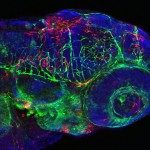Lien vers Pubmed [PMID] – 28724755
J. Cell. Sci. 2017 Jul;130(17):2797-807
Macrophages infiltrate and establish in developing organs from an early stage, often before these have become vascularised. Similarly, leukocytes in general can quickly migrate through tissues to any site of wounding. This unique capacity is rooted in their characteristic amoeboid motility, the genetic basis of which is poorly known. Trim33 (Tif1-γ), a nuclear protein that associates with specific DNA binding transcription factors to modulate gene expression, has been found mainly involved in hematopoiesis and gene regulation by TGF-ß. Here we have discovered that in Trim33 deficient zebrafish embryos, primitive macrophages are unable to colonize the central nervous system to become microglia. Moreover, both macrophages and neutrophils of Trim33 deficient embryos display a reduced basal mobility within interstitial tissues, and a profound lack of response to inflammatory recruitment signals, including local bacterial infections. Correlatively, Trim33 deficient mouse bone marrow derived macrophages display a strongly reduced three-dimensional amoeboid mobility in fibrous collagen gels. The transcriptional regulator Trim33 is thus revealed as essential for the navigation of macrophages and neutrophils towards developmental or inflammatory cues within vertebrate tissues.



